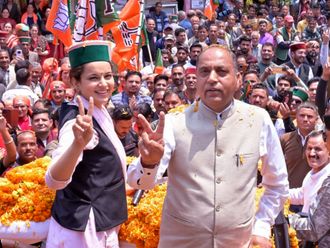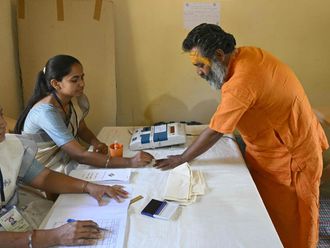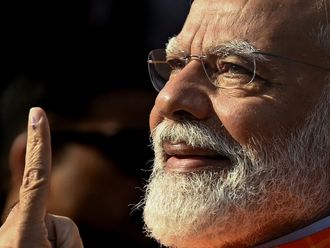Dubai: Geologist Arshu Khosla claimed that the Hindu deity, Brahma, discovered the dinosaur, receiving a backlash online. The statement was made in an interview published on Monday, in the Indian newspaper Indian Express.
At the Indian Scientific Congress (ISC) held from January 3 to 7, Khosla claimed that the word ‘dinosaur’ was of Sanskrit origin “…‘dino’ means terrible, it translates to ‘daayan’ (witch) and ‘saur’, which otherwise means lizard, is related to ‘asur’ (demons)…”.
Khosla, an associate professor at Panjab University, asserted that Brahma had early knowledge of dinosaurs, which was recorded in the Vedas (Hindu scriptures). Khosla added his credentials, stating that he was part of the team that discovered the Rajasaurus narmadensis dinosaur in 2003.
Scientific community distances itself
Indian social media users were alternately amused and concerned by this and other similar statements issued at the ISC. According to Indian media reports, some of the prominent statements that caused outcry included an attempt to discredit Einstein’s Theory of Relativity by physicist Kannan Krishnan and another attempt to rename gravitational waves as “Modi waves”.
Andhra University Vice Chancellor G. Nageswara Rao at the same event, claimed that the Kauravas were early examples of test-tube babies and the products of stem cell research in India.
“We do not subscribe to their views and distance ourselves from their comments. This is unfortunate,” said Premendu P. Mathur, general secretary of Indian Scientific Congress Association, to news agency AFP.
When logic holds no ground
Many social media users expressed their concerns about the quality of scientific research in India and the impression it made on the world stage.
Netizen @debasishborah tweeted: “Oh no. What a shame! It seems the Indian Science Congress has made it a tradition to have at least one talk/event which makes us a laughing stock of the world! #ISC2019”
Twitter user @1amnerd quoted developmental biologist @kvijayraghavan: “When lay people, including politicians, make erroneous statements, the problem must be addressed by collegial communication. When scientists do the same thing, they should be addressed more pointedly.”
Tweep @Srish__T posted was upset about how such statements received more attention than actual research done by scientists: “It is somehow unsettling when ‘scientists’ making non-scientific, sometimes bizarre statements, get more attention than the ones who are doing actual science. It is important that people get to know, but then what about ‘science’? #ISC2019”
Tweep @jkvijayakumar asked: “Where is the peer review?”
Others decided to fight science with science. Tweep @Neurophysik posted: “Okay, even if I believe 100 Kauravas were fertilised as eggs in earthen pots (‘test tubes’), did Gandhari [the mother of the Kauravas] not go through a post-fertilisation gestation for 100 babies? Or did that happen through artificial wombs, too?”
Global backlash
The statements made at the ISC attracted global attention, with news websites such as BBC and The Guardian reporting the public outcry. As a result of the widespread backlash, including protests at the Indian Institute of Science in the state of Bengaluru, the Indian Science Congress Association decided to form a monitoring panel for interactive sessions at the ISC, according to Indian news website livemint.com.












